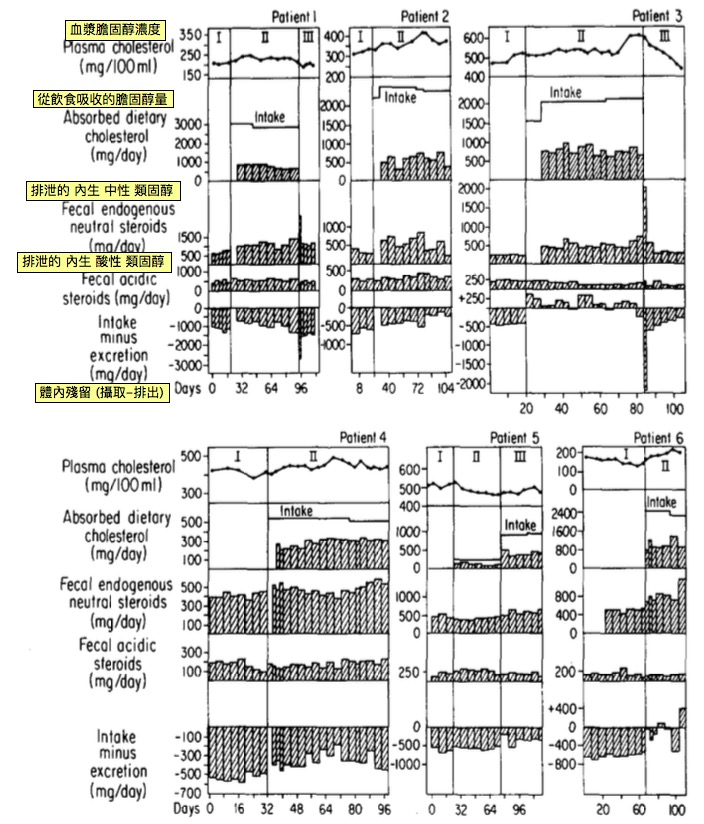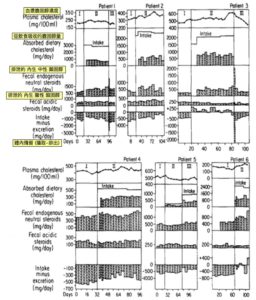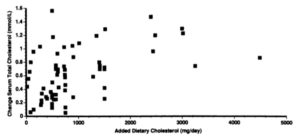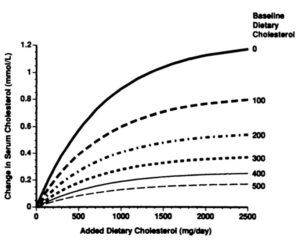Egg or no egg? The effect of cholesterol intakes on body pool and its mechanism: A simple review
關鍵字 dietary cholesterol, 膽固醇攝取 (cholesterol consumption), 補償機制 (compensatory mechanism), 膽固醇濃度 (cholesterol concentration), 心血管疾病 (cardiovascular disease (CVD))
前言
血液中膽固醇含量與心血管疾病有明顯的關聯1,但飲食習慣對於血液中膽固醇濃度的影響卻眾說紛紜,過去許多坊間報導宣稱攝取過多膽固醇會提高血液中膽固醇濃度2,但近期卻有報導稱已有研究證實是無關的3。因此本文目的為回顧過去學術研究論文,整理目前學界對於膽固醇攝取是否會影響血液中膽固醇濃度的議題之共識。
若不在乎研究歷史脈絡,欲先知道結論,請直接跳至文末最新進展之結論。
聲明
本篇是簡單的文獻回顧,不包含任何實驗,旨在快速呈現過去的研究及其進展,為求簡要,必然無法討論實驗嚴謹性及爭議之處,重點之節選純屬個人主觀看法,如需完整資訊,建議閱讀原文。對於任何推論,本文不負任何責任。
機制 (1971)
吸收與合成
Wilson (1964)4及Taylor & Ho (1967)5利用動物(狗、老鼠)進行實驗,餵食以同位素標記的膽固醇,發現長期下來體內的膽固醇大多數都是有標記的,而自行合成的只佔一小部分,這表示膽固醇攝取量變多後合成的機制就會受到壓抑。
至於在人類是否也是依循相同的機制呢?有些研究者認為無論如何攝取進的膽固醇都會被吸收6, 7, 8, 9,但後續研究發現,人體似乎為防止長期食物裡有太多膽固醇,故會限制吸收的總量,在經過相同的同位素標記法的實驗後,發現人的血漿裡的膽固醇中來自飲食的比例依然較少10, 11,顯示人的機制應該是更傾向於抑制吸收。
到目前為止,研究顯示當人體攝取的膽固醇過多時的平衡機制有:
- 減少吸收(absorption)
- 抑制體內合成(synthesis)
再排放
Quintao等人12令8位受試者進行高膽固醇飲食,並測量血漿中膽固醇濃度、吸收之膽固醇量,利用平衡法(sterol balance procedure)計算體內之殘留膽固醇,發現體內殘留之膽固醇並不會直接反應在血漿中膽固醇濃度上。
除此之外,人體攝取的膽固醇越多,吸收的越多,每攝取3g便會吸收1g左右的膽固醇,是呈現接近線性的關係。而除了合成減少外在吸收增加後還有另外一個補償機制(compensatory machanisms):再排放增加。
因此
- 膽固醇攝取量增加後的機制:
- 減少吸收(absorption)
- 膽固醇吸收量增加後的機制:
- 增加再排放(reexcretion)
- 抑制體內合成(synthesis)
再排放(reexcretion):養分在被小腸吸收後再次被排出到腸道中。
然而,這兩個補償機制在不同個體間的差異很大,大多數的人體內累積的量不會太多,亦即可以透過補償機制維持平衡,但有部分的人仍然會累積,而這些累積不一定會反應在血漿膽固醇濃度中。
血漿濃度
由上圖可以發現,儘管膽固醇的淨平衡(intake minus excretion)是增加的,但卻沒有完全反應在血漿濃度中,血漿膽固醇濃度的增加量不會超過20%,這表示增加的膽固醇是留在體內(body pool)中的其他地方而非血漿中。
而這個研究無法解釋在身體內的膽固醇是跑到哪了,研究發現兔子所吸收的膽固醇會出現在其體內的許多區域,但老鼠則是有很多出現在肝臟13。
模型 (1992)
Hopkins (1992)14蒐集了27個研究共76個受試者進行後設分析,並提出一個拋物線模型,描述膽固醇上升量與攝取量和平日攝取量(baseline)之關係。
[y = 1.22 e ^{-0.00384x_0} (1-e^{-0.00136x})]
當只有加入適量的膽固醇到每日飲食中,平日的飲食習慣可以預測膽固醇的增加量。這可以解釋為何每人的個體差異那麼大15, 16,平日飲食習慣攝取較多膽固醇的人較不會受到短期的影響,反之若平日極少攝取膽固醇,則單次的增加則會產生較大的變化。
而對於這個現象的解釋,Hopkins亦提出他的解釋,雖此現象似乎非常直覺,但其對於此現象的解釋稍嫌複雜,故在此不贅述,如有興趣可參考其討論部分。
最新進展 (2013)
2000年後之相關研究數量暴增,且更多細部討論,例如區分不同的攝取方式、食物、測量各種類的膽固醇、降膽固醇的各種治療方法比較等等。為求精簡,本文搜尋2000年後之回顧文獻再行回顧,並簡化重點如下。
正向關係
- 每天100mg膽固醇會增加血漿膽固醇濃度 (meta-analysis) 22, 23, 24
- 增加總膽固醇濃度 2.2-2.5 mg/dL
- 增加低密度膽固醇 1.9mg/dL
- 增加高密度膽固醇 0.3-0.4 mg/dL
- 影響很小25, 26, 27
無關
結論
究竟增加攝取膽固醇是否會增加血液中膽固醇濃度?無共識。35
後記
有許多省略未討論到的因素包含各實驗室否有控制組、測量受試者基礎值、膽固醇的攝取來源(食物種類)、高密度及低密度膽固醇等。
本篇靈感來自我體檢報告中偏高的膽固醇濃度,在聽說運動對於控制膽固醇濃度有幫助、飲食效果不大後,本欲設計人體實驗,但檢討過去發文決定先閱讀相關文獻,或許之後補上運動方面效果的文獻。因目前學界無共識,可以考慮進行飲食控制與運動量的2*2變項自身實驗。
- Hooper, L., Summerbell, C. D., Higgins, J. P., Thompson, R. L., Capps, N. E., Smith, G. D. & Ebrahim, S. (2001). Dietary fat intake and prevention of cardiovascular disease: systematic review. Bmj, 322(7289), 757-763. ↩
- 7大好「心」食物 降低膽固醇 ↩
- 每天吃3顆蛋,竟可降壞膽固醇!你一定要知道的 5 個膽固醇新常識 ↩
- Wilson, J. D. 1964. The quantification of cholesterol excretion and degradation in the isotopic steady state in the rat: the influence of dietary cholesterol. J . Lipid Res. 5: 409-417. ↩
- Taylor, C. B., and K.-J. Ho. 1967. A review of human cholesterol metabolism. Arch. Pathol. 84: 3-1 4. ↩
- Stanley, M. M., and S. H. Cheng. 1956. Cholesterol exchange in the gastrointestinal tract in normal and abnormal subjects. Gastroenterology. 30: 62-74. ↩
- Karvinen, E., T. M. Lin, and A. C. Ivy. 1957. Capacity of human intestine to absorb exogenous cholesterol. J. Appl. Physiol. 11: 143-147. ↩
- Borgstrom, B. 1969. Quantification of cholesterol absorption in man by fecal analysis after the feeding of a single isotope-labeled meal. J . Lipid Res. 10: 331-337. ↩
- Dietschy, J. M., and J. D. Wilson. 1970. Regulation of cholesterol metabolism. N . Engl. J . Med. 282: 1128-1 138, 1179-1183, 1241-1249. ↩
- Kaplan, J. A., G. E. Cox, and C. B. Taylor. 1963. Choles- terol metabolism in m a n : studies on absorption. Arch. Pathol. 76: 359-368. ↩
- Wilson, J. D., and C. A. Lindsey, Jr. 1965. Studies on the influence of dietary cholesterol on cholesterol metabolism in the isotopic steady state in man. J. Clin. Invest. 44: 1805-1814. ↩
- Quintao, E., Grundy, S. M., & Ahrens, E. H. (1971). Effects of dietary cholesterol on the regulation of total body cholesterol in man. Journal of lipid research, 12(2), 233-247. ↩
- Perl, W., and P. Samuel. 1969. Input-output analysis for total input rate and total traced mass of body cholesterol in man. Circ. Res. 25: 191-199. ↩
- Hopkins, P. N. (1992). Effects of dietary cholesterol on serum cholesterol: a meta-analysis and review. The American journal of clinical nutrition, 55(6), 1060-1070. ↩
- Jacobs DR, Anderson JT, Blackburn H. Diet and serum cholesterol. Do zero correlations negate the relationship? Am J Epidemiol 1979;l 10:77-87. ↩
- Hopkins PN, Williams RR, Kuida H, et al. Predictive value of a short dietary questionnaire for changes in serum lipids in high-risk Utah families. Am J Clin Nutr 1989;50:292-300. ↩
- Castelli WP. Epidemiology of coronary heart disease: the Framingham study. Am J Med 1984;76(2A):4–12. ↩
- Martin MJ, Hulley SB, Browner WS, Kuller LH, Wentworth D. Serum cholesterol, blood pressure, and mortality: implications from a cohort of 361,662 men. Lancet 1986;2:933–6. ↩
- Castelli WP, Garrison RJ, Wilson PW, Abbott RD, Kalousdian S, Kannel WB. Incidence of coronary heart disease and lipoprotein cho- lesterol levels. The Framingham Study. JAMA 1986;256:2835–8. ↩
- Klag MJ, Ford DE, Mead LA, He J, Whelton PK, Liang KY, Levine DM. Serum cholesterol in young men and subsequent cardiovascular disease. N Engl J Med 1993;328:313–8. ↩
- Stamler J, Daviglus ML, Garside DB, Dyer AR, Greenland P, Neaton JD. Relationship of baseline serum cholesterol levels in 3 large cohorts of younger men to long-term coronary, cardiovascular, and all-cause mortality and to longevity. JAMA 2000;284:311–8. ↩
- Clarke R, Frost C, Collins R, Appleby P, Peto R. Dietary lipids and blood cholesterol: quantitative meta-analysis of metabolic ward stud- ies. BMJ 1997;314:112–7. ↩
- Howell WH, McNamara DJ, Tosca MA, Smith BT, Gaines JA. Plasma lipid and lipoprotein responses to dietary fat and cholesterol: a meta- analysis. Am J Clin Nutr 1997;65:1747–64. ↩
- Weggemans RM, Zock PL, Katan MB. Dietary cholesterol from eggs increases the ratio of total cholesterol to high-density lipoprotein cholesterol in humans: a meta-analysis. Am J Clin Nutr 2001;73: 885–91. ↩
- Herron KL, Vega-Lopez S, Conde K, Ramjiganesh T, Roy S, Shachter NS, Fernandez ML. Pre-menopausal women, classified as hypo- or hyperresponders, do not alter their LDL/HDL ratio following a high dietary cholesterol challenge. J Am Coll Nutr 2002;21:250–8. ↩
- Herron KL, Vega-Lopez S, Conde K, Ramjiganesh T, Shachter NS, Fernandez ML. Men classified as hypo- or hyperresponders to dietary cholesterol feeding exhibit differences in lipoprotein metabolism. J Nutr 2003;133:1036–42. ↩
- Greene CM, Zern TL, Wood RJ, Shrestha S, Aggarwal D, Sharman MJ, Volek JS, Fernandez ML. Maintenance of the LDL cholesterol:HDL cholesterol ratio in an elderly population given a dietary cholesterol challenge. J Nutr 2005;135:2793–8. ↩
- Greene CM, Zern TL, Wood RJ, Shrestha S, Aggarwal D, Sharman MJ, Volek JS, Fernandez ML. Maintenance of the LDL cholesterol:HDL cholesterol ratio in an elderly population given a dietary cholesterol challenge. J Nutr 2005;135:2793–8. ↩
- Reaven GM, Abbasi F, Bernhart S, Coulston A, Darnell B, Dashti N, Kim H, Kulkarni K, Lamendola C, McLaughlin T, et al. Insulin re- sistance, dietary cholesterol, and cholesterol concentration in post- menopausal women. Metabolism 2001;50:594–7. ↩
- Goodrow EF, Wilson TA, Houde SC, Vishwanathan R, Scollin PA, Handelman G, Nicolosi RJ. Consumption of one egg per day increases serum lutein and zeaxanthin concentrations in older adults without altering serum lipid and lipoprotein cholesterol concentrations. J Nutr 2006;136:2519–24. ↩
- Wenzel AJ, Gerweck C, Barbato D, Nicolosi RJ, Handelman GJ, Curran-Celentano J. A 12-wk egg intervention increases serum zeax- anthin and macular pigment optical density in women. J Nutr 2006; 136:2568–73. ↩
- Mayurasakorn K, Srisura W, Sitphahul P, Hongto PO. High-density lipoprotein cholesterol changes after continuous egg consumption in healthy adults. J Med Assoc Thai 2008;91:400–7. ↩
- Katz DL, Evans MA, Nawaz H, Njike VY, Chan W, Comerford BP, Hoxley ML. Egg consumption and endothelial function: a randomized controlled crossover trial. Int J Cardiol 2005;99:65–70. ↩
- Njike V, Faridi Z, Dutta S, Gonzalez-Simon AL, Katz DL. Daily egg consumption in hyperlipidemic adults–effects on endothelial function and cardiovascular risk. Nutr J 2010;9:28. ↩
- Shin, J. Y., Xun, P., Nakamura, Y., & He, K. (2013). Egg consumption in relation to risk of cardiovascular disease and diabetes: a systematic review and meta-analysis. The American journal of clinical nutrition, ajcn-051318. ↩



